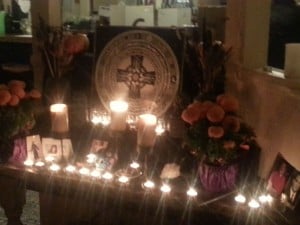Over 1000 years of Christian domination, enforced by swords and guns, fires and pogroms, has decisively changed the way even most non-Christian Westerners view the world. Most particularly, it has made it difficult for people to see the world as anything more than a backdrop of the human drama, the stage upon which we strut, and a supply of resources to be used as we wish. In America, this tendency reached its most extreme expression. The Protestant conception of God tended to be completely transcendent, and the world was seen as fallen, often thought of as doomed to be destroyed in the final battle with Satan. This battle was between absolute good and absolute evil. If there were spiritual forces in the land, they were likely of the devil. Angels came from elsewhere, if they were admitted to exist at all.
Western science incorporated secular forms of these views. Nature was red in tooth and claw and without moral worth. Morality had to come from reason if it did not come from divine command. Either way, it came from elsewhere than the world. An abstract God was followed by abstract thought.
For a long time, the dominant scientific view of animals was that they were not really conscious and did not have individuality worthy of consideration. When Jane Goodall published the first of her groundbreaking works on chimpanzees, reviewers took great exception to her giving chimps names rather than numbers. Wherever value could be found, it could not be found in the world, where even perceptions of natural beauty were regarded as about as informative as preferring chocolate ice cream over vanilla.
In short, the Christian dichotomization of reality into good and evil took on a secular twist. Humans had value, often absolute value, and nature had none. Her only value was as a servant to us. Evil was replaced by the complete absence of value. This is the world view nearly all of us inherited.
This is the worldview that Pagan spirituality challenges, and it does so all the way down.
The difference between Pagan traditions and Western monotheism are far deeper than whether we worship one god or honor many. When modern Westerners become Pagan, and begin to think about the implications of their religion, they enter onto a path of learning that will transform them if they allow it to. Immanence, Harmony, and Beauty are key concepts that tell us how.
Immanence
Initially it might still seem to new Pagans that the sacred is elsewhere, away from us. If it is not in Heaven, then it is in Valhalla, the Summerland, on top of Mount Olympus, anywhere but around us. With such a view, it is easy to turn Pagan deities into versions of the Christian God, living far away in His heaven, bestowing blessings from above on His favored people. To me this attitude is Paganism 1, not even 101. There is an aspect of this view that I think is true, but it barely scratches the surface of Pagan spirituality. If we stop there, we have safely domesticated Pagan insights so they will fit politely within a Christian and secularized Christian world. We celebrate the Solstice, they celebrate Christmas, and nothing else changes.
But Pagan religion universally sees Spirit as immanent and often also as transcendent. Immanence, the idea that the world itself is in some sense sacred, is one of the most fundamental distinctions between Pagan religion and transcendental monotheism. There were major Greek deities that to some degree existed separate from us in a transcendent realm. But every stream had its maenad, every tree its dryad, and the distinction between the physical world and the gods was often nonexistent, as when Odysseus was battling for his life in the sea and saved by a river. It is outside the polis, in nature, that Socrates is possessed by a nymph and a deity. Similar insights were held elsewhere, in societies as varied as those of the Celts and Native Americans. The world was responsive and we were but one dimension, one “nation” among many, as many Indian tribes would say.
When spirit manifests in and through the world, the world is filled with meaning beyond the narrowly human. It is no accident that most of us are impressed with its beauty and peace, its capacity to help us get out from under our personal worries and be refreshed by entering a broader context. These are the most easily accessible dimensions of what the world really is. Pity the person who lacks such a capacity! Realizing these perceptions are not analogous to preferring chocolate over vanilla ice cream is a first step towards appreciating the sacred in the world.
Scientists have recently discovered that when people are out in nature, their being immersed in the other-than-human increases our physical and mental well-being. Even more significantly, these increases appear correlated with the variety of plants in our area. The more varied the environment, the stronger the impact. Hospitals have discovered people heal more quickly when they can see a beautiful scene outside. Photographs do not work as well. We are integrated into our world far more deeply and subtly than we are into purely human constructions such as rooms and cars, and deprivation of contact is bad for us mentally and physically.
Pagan practice opens us to still another dimension of our world: that it can respond to us today as a river once responded to Ulysses. We are immersed within a field of awareness that is greater than us.
My own initiation into a more shamanic practice of Paganism took place on the final night of a several-day vision quest high on a mountain in California. It was one of the strongest and initially most terrifying experiences I ever had, and opened me up to ways of perceiving and feeling that have never left me. That was some 20 years ago.
Pagan traditions pretty much universally say that to make these stronger connections we must put out the effort, whether alone on a vision quest or with others in rituals seeking to make contact with the immanent more-than-human. In a way similar to establishing good human relationships, acts of care and gratitude help to create relationships with the more-than-human.
As a society we “know” this kind of thing cannot be true, and so, like the famous example of people watching a basketball change hands and never seeing the gorilla walking across the court, people never take notice of what they “know” cannot be there. Nor do they seek relationships when they believe such relationships could not exist. Shifting to believing in many Gods rather than one or none does not automatically change this experience, but it opens the door to new realizations for those who pay attention.
Harmony
All religions realize something is out of kilter between human society and the largest contexts of meaning. We are captivated by our most immediate concerns and beguiled by the promise that power and wealth will set right the problems of our lives. Religions seek to restore our relations within larger contexts that can make the darkest parts of our lives bearable and add dimensions of joy we otherwise would not experience. Religions such as Christianity promise salvation; others such as Buddhism promise enlightenment. Both share two basic assumptions: worldly life is intrinsically flawed and we can only save ourselves. Ultimately we are alone.
Because they conceived the world as reflecting or embodying the sacred, worldwide Pagan religions have emphasized a different strategy: restoring a lost harmony. A traditional African proverb puts this insight very well: “I am because we are.” We can restore harmony within ourselves, restore it within our society and restore it between our society and the more-than-human world.
When anyone speaks of harmony, they inevitably speak of relationships. I seek salvation for myself. I cannot be in harmony by myself. It takes at least two notes to harmonize. Harmony situates us squarely amid “all or relations,” mitakuye oyasin, as the Lakota blessing goes.
And who are our relations? We know today that we arose out of the world. We are genetically extraordinarily close to chimpanzees, and having mirror neurons seems central to our ability to care for others. There is no sharp biological or mental gap between us and the rest of life unless, ironically, it is in our capacity to care for other beings with whom we have no relationship and expect no benefits from in the future. In other words, if we are unique, it is in our capacity to love more widely and deeply than others. As Aldo Leopold observed,
For one species to mourn the death of another is a new thing under the sun. . . . we, who have lost our [passenger] pigeons, mourn the loss. Had the funeral been ours, the pigeons would hardly have mourned us. In this fact, rather than in Mr. Du Pont’s nylons or Mr. Vannevar Bush’s bombs, lies objective evidence of our superiority over the beasts.
Further, if the world is sacred, no single part of it is just a thing. Every dimension has some connection to the more-than-human. Some of us who have pursued or been led into more shamanic dimensions of our Pagan path know that when properly approached plants and even land forms and the ocean can respond.
No one has ever suggested that as a consequence we should not make use of the world. We are as much a part of it as anything else, and all beings make use of the world. But ideally we make use of it with an awareness that what we use is not just our tool. The original Pagan insight was to relate to everything with respect.
This insight about respect transforms how we view our most appropriate ways to act both towards one another and towards the other-than-human. Consider for a moment the secular doctrine of rights, which has religious roots in its earliest expressions and which even in secular form treats individual right holders as discrete units analogous to individual souls.
Some environmentalists are confused today about the issue of animal rights because they realize nature has moral standing and our language for talking about morality revolves around rights. But the world of nature depends on predation. Even farmers destroy the homes of many beings when preparing a field and kill others to defend their crops. To live is to take life. The language of rights simply does not work here, and so, like the ‘pro-life’ movement, the strongest advocates for ‘animal rights’ use intensity of belief and self-righteousness to replace the lack of reason and evidence for their views. But this problem is rooted in accepting how the Christian and secular West thinks about ethics.
To take another example, many free market liberals and libertarians say that because nature does not have rights, we have no ethical responsibilities to the nonhuman world beyond acting in our self-interest. Like animal rights advocates, they assume that rights constitute the basic ethical concept. When a society with such views loses belief in arguments for rights, many of its members become nihilists, either refusing to stick their necks out for any principle, or putting power and domination ahead of all other considerations. Our society has become so today.
A Pagan perspective heals these confusions.
Around the world, the initial ethical approach to the world in Pagan societies has been respect. All things have genuine value of their own, and so all things are appropriately treated with respect. Certainly this was the ethic of hunting and gathering peoples who achieved sustainable relations with their environment.
What then of rights? They are the form respect takes among equals who are strangers. They are not a good way to describe all good human relationships. As soon as we are friends and lovers, other values take precedence over rights. For example, while I have the right to free speech, I have no right to talk unfeelingly or rudely to my friends and intimates. Doing so, especially consistently, converts that relationship to one of strangers. If my friend is drunk and wants to drive home, I might act better as a friend by taking their car keys than not, even if I thereby violate their right to their property.
This point means that a Pagan sensibility does not eliminate the idea of human rights, it places them within a deeper and more all encompassing framework of getting the relationships right. Doing so establishes and maintains harmony.
Beauty
The world is beautiful. This is so universal a perception that what requires understanding are those few poor souls who do not see it. When we love something or someone, we love their beauty. When we see beauty, it calls forth our love for it. Beauty and love are two sides of the same phenomenon. In people we might be attracted initially by their physical beauty, but if our love deepens, we are also attracted by their inner beauty.
Love and beauty are two of three qualities Pagan mystics have said unite the world in a seamless whole: the good, true, and beautiful. Love is the ultimate expression of the good, beauty is integral to love, and the realization of this unity is what we grasp as most ultimately true.
In this sense, that which is beautiful celebrates the sacred. A beautiful flower or sunset or storm expresses and celebrates the sacred. So does a beautiful ritual. And the more deeply we are aware of the sacred, the more pervasive our perception of beauty becomes.
When we see something or someone as beloved and beautiful, we want to be in harmony with it or them. This does not mean that those we love are not also useful, but that is not why we love them. We love them because they are beautiful, and love them more deeply the more deeply we see their beauty. To refer to my distinction in an earlier essay between house, home, and temple, we seek to be at home rather than just be passing through on a journey elsewhere, because that ‘elsewhere’ will never be reached until we realize it is also here. As the Charge of the Goddess states:
And thou who thinkest to seek Her, know thy seeking and yearning shall avail thee not unless thou knowest the mystery; that if that which thou seekest thou findest not within thee, then thou wilt never find it without thee. For behold, She has been with thee from the beginning; and She is that which is attained at the end of desire.
By seeking harmony in our lives, in our communities human and more-than-human alike, and in our rituals together, we seek greater harmony with that which is more than any of these. And in doing so, we heal ourselves and our relationships of many of the distortions that arose when a world-denying outlook became our guide for relating to the world.















